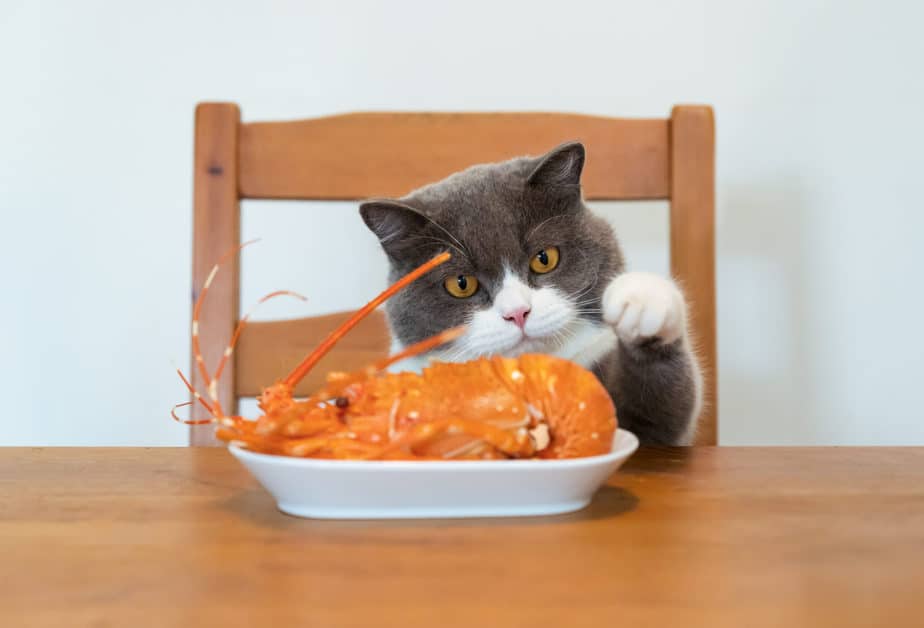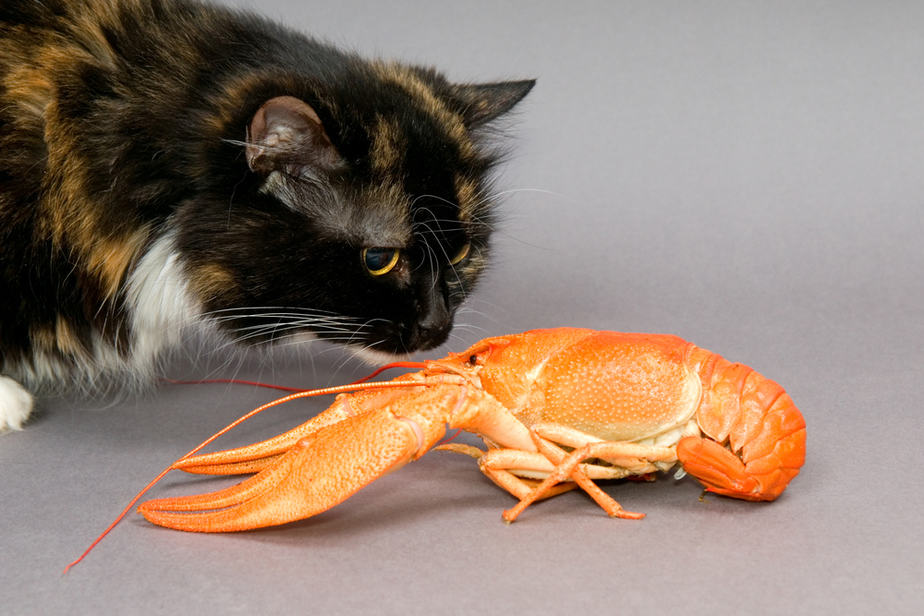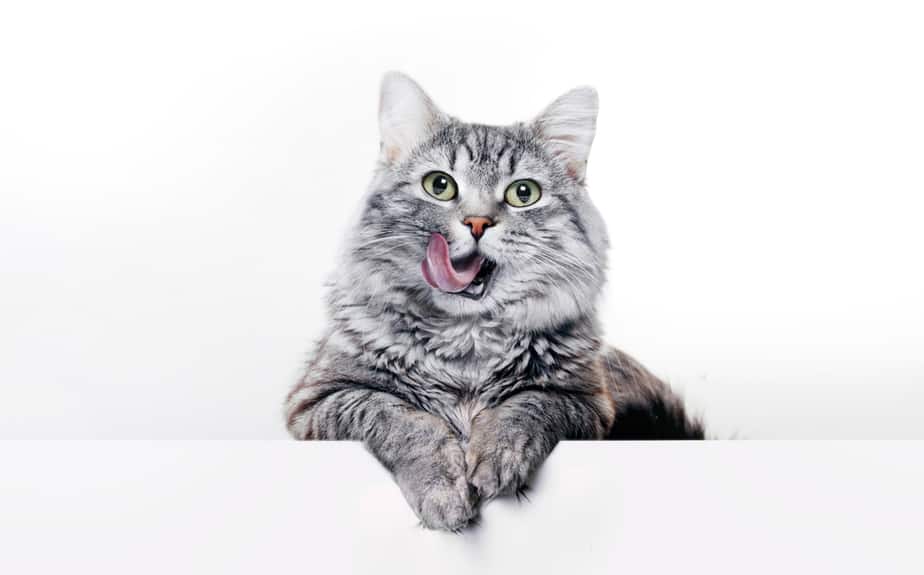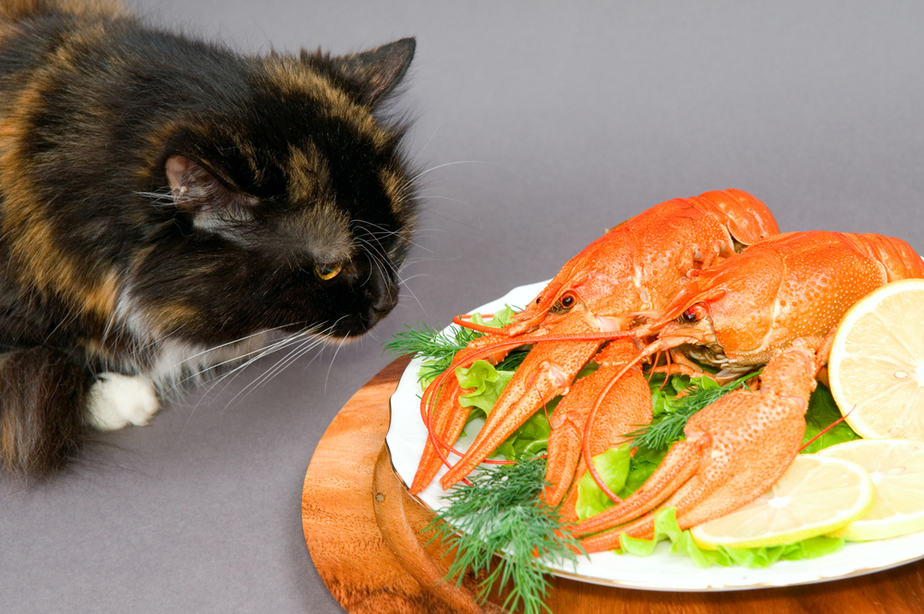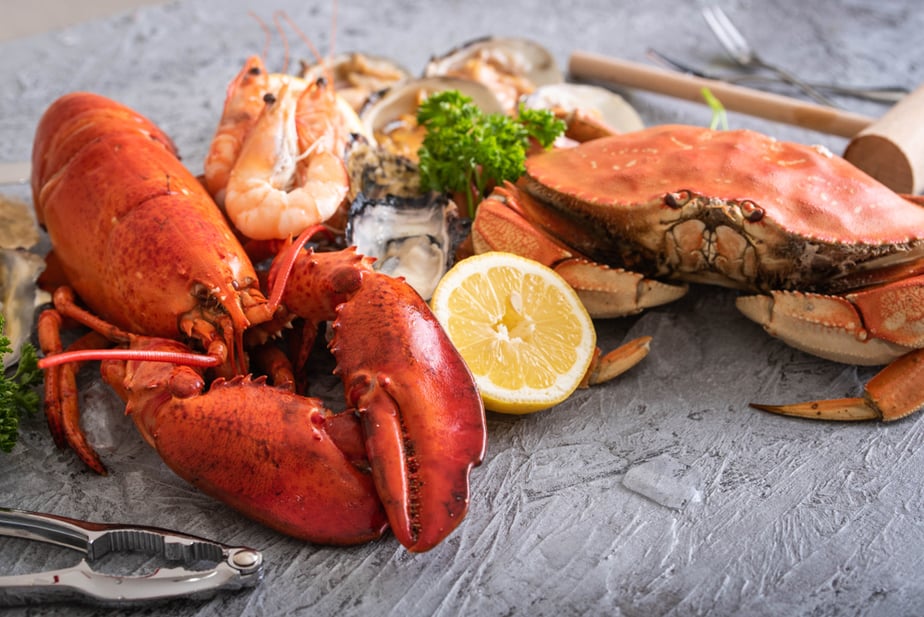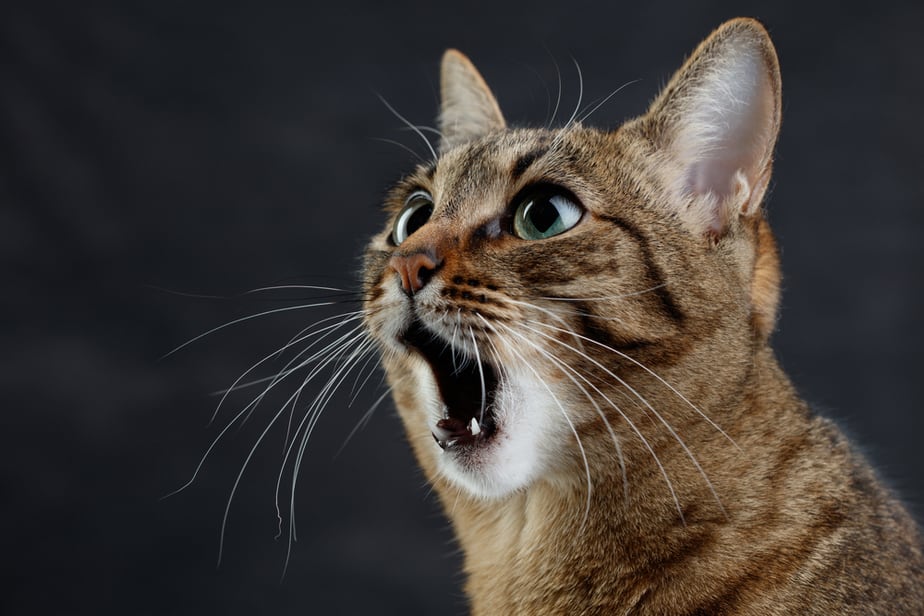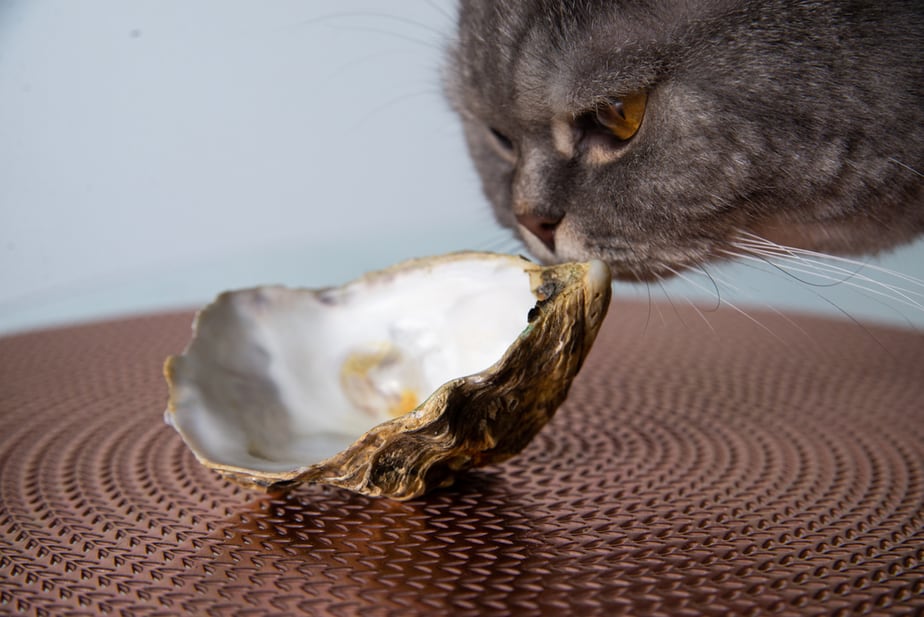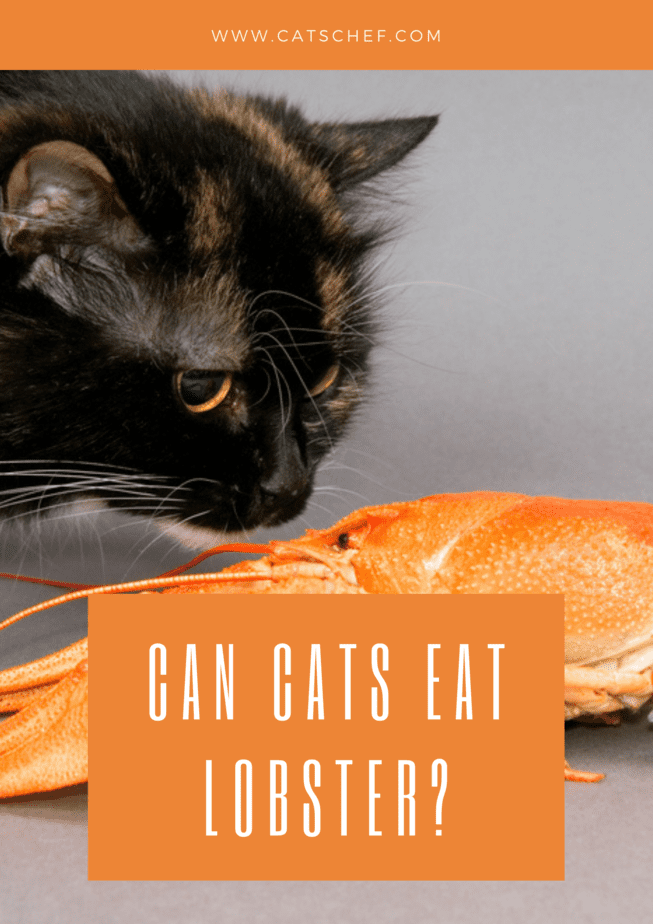📖 Table of Content:
Diverse food helps keep us humans healthy and satisfied. This is where seafood plays a big role, too. But what about cats, are they allowed anything other than regular cat food? Can cats eat lobster, for instance?
Lobster is a great source of health supplements for humans. It’s also an amazing choice when you get bored with your regular food. Seafood offers us a variety such as clams, fish, crabs, and others.
Some crucial nutrients that are needed for our health are found just in seafood. To see whether cats can eat lobster, we are going to reveal the benefits and disadvantages of this particular crustacean.
Is lobster safe for cats?
Lobster is considered a safe food for cats to eat. Just like fish, it can provide your pets with many beneficial nutrients. If you have never offered this type of food to your cat before, just make sure you start slow.
Introduce this seafood in small portions, cooked. No additional spices and seasonings included. Cats can have a hard time digesting our usual condiments. If the introduction goes well and your cat’s stomach approves, you’re good to go.
Never offer your feline raw lobster because it could upset her stomach. Raw foods can especially be risky because of potential bacteria and parasites. Make sure you prepare her food so she enjoys it and you don’t have to worry about negative consequences.
Overall, lobster is safe for your furkid. This type of seafood can be fed occasionally, providing that she isn’t allergic to seafood. It’s probably best if you talk to your veterinarian before introducing any new foods.
What are the benefits of cats eating lobster?
Lobster isn’t the main dietary choice for cats. Yet, it can serve as a healthy occasional treat for your feline. The good news is that lobster is rich in protein. Felines need protein on a daily basis and regular intake is a necessity for them.
Generally speaking, seafood is a great source of nourishment. For instance, fish like salmon and tuna encourages a shiny coat and moisturized skin.
So rest assured, you can safely share some fish or lobster with your kitten.
Omega-3 fatty acids
These fats are often found in marine sources, including lobster. Lobster doesn’t have as much omega-3 as tuna, for example. Still, it can help with your cat’s skin, coat, and joints. Omega-3 fatty acids strengthen the hair follicles, which results in healthier fur and less shedding.
These fats also have anti-inflammatory properties that help with joint inflammation. This is especially helpful for senior cats. It makes their moving easier and helps decrease joint pain. For younger felines, omega-3 ensures easier movements like jumping.
Polyunsaturated fats found in lobster, such as omega-3 fatty acids, have many health benefits for cats. They can help in maintaining good cholesterol levels. This means a lower risk of stroke and heart diseases.
Minerals
Lobster is a mineral-dense seafood, containing copper, zinc, selenium, phosphorus, and magnesium. These supplements help protect your feline’s immune system and boost her overall health.
Copper helps in different body functions in cats, including the formation of bones and connective tissues. Moreover, it helps iron to form red blood cells. Anemia in cats is tied to copper deficiency.
Both zinc and copper are antioxidants and help in reducing inflammation. Zinc can help speed up the process of wound healing too.
Selenium plays an important role in a cat’s immune system as well. It’s good for her overall health and helps protect your feline from certain diseases such as cancer.
Phosphorus bonds with calcium to make calcium phosphate. These two minerals are necessary for cats’ bone health. Any medical conditions that are related to bones may be a sign of calcium deficiency. This deficiency can reflect badly on your cat’s bones and teeth.
Vitamins
Vitamins are also essential for your cat. They make sure your fluff stays in optimum health. Lobster offers a number of vitamins, but the most important ones are vitamins E and B12.
Vitamin E serves as an antioxidant for your pet’s body, helping to strengthen cells. A vitamin E deficiency can lead to muscle weakness and other health problems. A weakened immune system can also be the cause of the lack of this vitamin.
If your pet is having some digestive problems, she probably lacks some vitamin B12. In addition to aiding the digestive system, vitamin B12 helps with the nervous system and cognitive functions. This supplement prevents anemia and helps with loss of appetite in cats.
A source of protein
Lobster is great for cats as it is a source of protein. Protein is a necessity for felines as it helps with building muscle mass. Carnivores can thank protein for many reasons. Apart from keeping their nervous system healthy, protein fuels their immunity.
We can say that protein is responsible for your feline’s wellbeing. If your cat isn’t getting enough protein, she will experience adverse consequences, such as weight and muscle loss, and overall weakness.
Meat is felines’ dietary staple as it’s high in protein content. Protein derived from animals serves their health, and so does that from lobster. Lobster meat is even considered to be of a higher quality and richer in protein than red meat.
Felines need protein to produce energy as they are obligate carnivores. This means they have a hard time digesting any other material that isn’t meat-based.
Can eating lobster be bad for cats?
Cats eating lobster can be bad for a couple of reasons. Your cat may have allergies, just as humans do. One of the most common ones is a seafood allergy.
If you notice your cat having trouble breathing, it’s possible she’s allergic to lobster. Other signs of seafood allergy are lethargy, itchiness, and skin rashes. Some more common symptoms include vomiting, diarrhea, and abdominal pain.
Due to the fact that cats are prone to having seafood allergies, make sure you feed lobster in small portions.
If your feline doesn’t exhibit any of the abovementioned signs, then you’re safe to proceed. However, if she shows any allergic reaction, make sure to contact your vet for further instructions and treatment.
Can cats eat raw lobster?
There is no debate on this one. Cats shouldn’t eat raw lobster, or any raw seafood, for that matter. The reason behind this is that raw seafood, including lobster, poses a risk of pathogens. Raw lobster can be a carrier of certain bacteria and parasites.
Food poisoning can occur if your cat has eaten larger amounts of raw lobster. Uncooked lobster can also upset your cat’s stomach and wreak havoc in her digestive tract. So, there is a possibility that lobster will make your cat sick.
Cooking the lobster for your feline can save both you and her some trouble. Properly cooked lobster at high temperatures can kill all the potential bacteria. Besides, cooked lobster is easier for your cat to chew and digest.
While cooking it, make sure you avoid seasonings and spices. By adding table condiments such as salt, you’re putting your furchild at risk. Excessive amounts of salt can cause sodium poisoning in felines.
If your pet eats lobster with additional seasoning and spices, she may display different symptoms. With an upset stomach, nausea and vomiting aren’t uncommon, as well as other mild symptoms such as diarrhea.
Can cats eat lobster shells?
This is a hard no. Lobster shells are hard and sharp, and they can cause abdominal pain. Although they aren’t poisonous to cats, they should be removed for safety measures. If your cat gulps down a piece of lobster shell, don’t panic.
However, cats are curious creatures and we all know what killed a cat. Lobster shells, although non-toxic, are a choking hazard. If your cat grabs a hold of a larger piece, it’s possible it will get stuck.
Cats have sharp teeth, but lobster shells are just too hard for them. Besides choking on them, shells are sharp and can easily cut her. These sharp pieces can cause injuries on her lips, in her mouth, or even throat.
Therefore, remove the shell if you intend on sharing the lobster with your fluff. Apart from being a choking hazard, they can cause cuts and are just too hard to bite down on.
What other seafood can cats eat?
Seafood offers a variety of health supplements for humans and cats as well. However, seafood shouldn’t replace your feline’s regular diet in any way. Even though it’s rich in vitamins and minerals, cats require high amounts of protein.
Another seafood option that’s safe for cats to eat is squid.
Fish
If you want to diversify and enrich your feline’s menu, fish is a great way to do so. Tuna, sardines, and salmon are all great options when it comes to your furry monster. Their oils provide certain fats that are beneficial to your pet’s health.
These fish also come in canned forms. These are generally safe for your cat, but watch out for any additional seasonings or spices. Also, rinse out the fish if you know it’s salty. Felines and salt are not friends.
That said, fresh fish is way better. If you provide your cat with fresh fish, make sure it’s properly cooked. Don’t make this an everyday meal though. Cats need a balanced diet that will ensure their optimal health.
Anchovies are also safe for cats to eat. They are an amazing source of nutrients for your cat and come in various forms.
Can cats eat crab?
Yes, cats can eat crab. Although crab isn’t toxic to cats, it should be fed in moderation. Crab meat is packed with vitamins and minerals. These supplements serve your cat’s immune system and boost her wellbeing.
However, the same rule applies to crab meat as to lobster. Make sure you don’t feed your feline raw crab. This can negatively impact your cat’s health due to possible pathogens.
What about oysters?
Unfortunately, you should avoid giving your cat oysters. The reason behind this is the enzymes that oysters contain. These enzymes can destroy a supplement that’s crucial to your feline’s health.
These enzymes found in oysters can lead to thiamine deficiency in your cat. Thiamine deficiency causes disorders of neurological nature, such as tremors and seizures. Apart from that, oysters may contain bacteria that can cause food poisoning.
Bottom line
To conclude, cats can eat lobster. Lobster is a great source of protein, which cats can’t go without. This helps their overall wellbeing, muscle mass, and is their primary energy source. Lobster meat is also packed with vitamins and minerals essential to your cat’s diet.
However, lobster is only safe for cats as long as it’s cooked. While cats can technically eat raw lobster, it won’t benefit them, and can cause them more harm than good. Uncooked lobster may carry certain germs and bacteria.
When preparing lobster for your four-legged companion, make sure you don’t add any spices or seasons. Also, avoid feeding lobster shells to cats – they are sharp and hard. They pose a threat to your beloved pet’s health.
Shells of crustaceans can injure your feline in terms of cuts in the mouth and throat, and they are also a choking hazard. Therefore, make sure you remove all of the shell before feeding lobster to your cat.
Read more: Can Cats Eat Squid? Prepare It Right And Turn It Into A Real Treat
